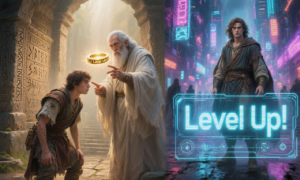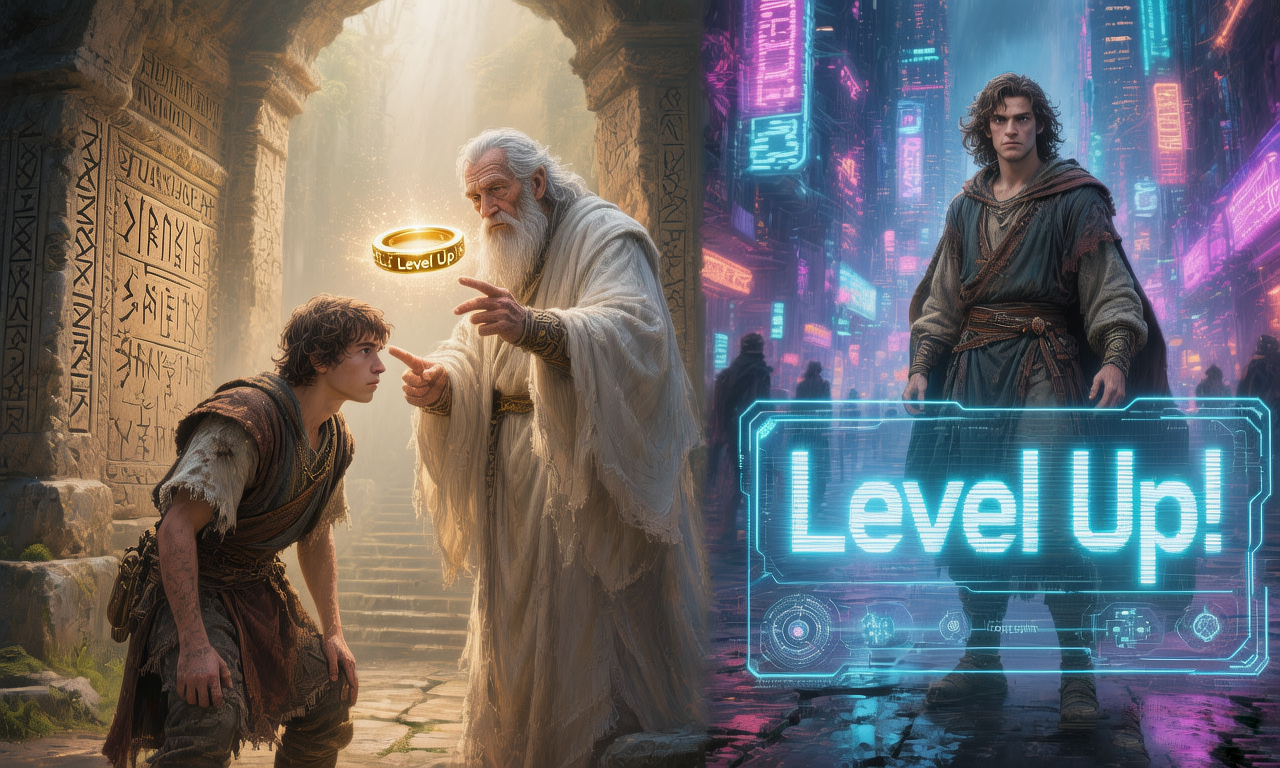Have you noticed something missing from today’s cultivation webnovels? It used to be a guarantee: the young hero would be deemed useless, only to stumble upon a powerful, ancient spirit living inside a ring or a sword. This figure, often called the “Old Man,” was the hero’s guide, teacher, and cheat code.
But where did the old man go?
Today, that old sage has been replaced by a holographic screen, a cool voice, or a set of game stats. This shift is the core of the system trope evolution. It is a major change that reflects how fast modern webnovel genre trends are moving. We are going to explore why this change happened and what it means for the future of the power fantasy.
The Golden Age of the Old Man in Ring Trope
For years, the “Old Man in the Ring” was a staple. This element, often called the old man in ring trope, was simple but effective.
The mentor was usually a powerful immortal who had been killed or sealed and was now looking for a successor. They offered the protagonist three things:
- Guidance: They explained the complex world of cultivation, saving the hero years of confusion.
- Knowledge: They provided overpowered techniques, pills, and secrets that others could only dream of.
- Emotional Support: They were a comforting figure, a kind of surrogate father who believed in the hero when no one else did.
This trope built tension slowly. The hero had to earn the Old Man’s approval. The mentor often withheld information, forcing the protagonist to grow and struggle. This struggle made the eventual success feel earned. Classic stories used this dynamic to build a strong emotional connection between the hero and the guide.
However, this classic approach had a downside: it slowed things down. Readers had to wait for chapters while the mentor explained ancient history or taught basic techniques. As reading habits changed, the need for immediate action grew.

The Rise of the System
The System is the direct answer to the speed problem. It is the ultimate automation tool in a modern power fantasy.
Instead of a wise old man teaching skills one by one, the System does it instantly. The hero simply hears a voice or sees a floating screen that says: “Congratulations! Skill ‘Void Slash’ acquired.” The knowledge is instantly uploaded. There is no need for long explanations or slow training montages.
This shift to the System streamlined the narrative. The hero’s attention is immediately back on the main plot: fighting, exploring, or gaining more loot. The System acts like an impartial, efficient tool. It tracks progress, gives quests, and provides rewards without demanding emotional engagement or loyalty.
The introduction of game mechanics, like experience points (EXP) and skill trees, makes progress clear and measurable. This is deeply satisfying for the reader. We can literally see the hero’s power level increase after every fight, which speeds up the gratification loop. This is the heart of the system trope evolution—turning a philosophical journey into a tangible, trackable game.
The New Reader Demand
Why did readers demand this change? It comes down to evolving webnovel genre trends and the psychology of reading in the digital age.
The modern reader often consumes hundreds of chapters a week. They are looking for a continuous stream of action and success. The long, slow buildup of classic cultivation stories can feel tedious when you have thousands of other titles waiting.
The System caters to a faster-paced culture. It allows the author to quickly give the hero everything they need to be strong, letting the story focus on using that power rather than gaining it. This creates a very strong and immediate modern power fantasy.
The Old Man demanded patience; the System rewards speed. Furthermore, the System provides an objective, reliable source of power. Unlike the old man in ring trope, where the mentor might be hiding secrets or have a dark past, the System is usually just a neutral, functional tool. This lack of emotional baggage keeps the story simple and focused on action.
New Challenges and Successors to the Mentor
While the System efficiently replaced the teaching function of the Old Man, it created a new narrative vacuum. The System is cold; it cannot provide encouragement or wisdom. So, what replaced the mentor’s emotional role?
The answer is often found in the protagonist’s own personality, or in a new set of webnovel genre trends.
- Protagonist Autonomy: Modern heroes are often more competent and ruthless from the start. They rely on their past-life knowledge (another type of cheat) and their own intelligence. They don’t need a babysitter.
- The System as a Character: In some cases, the System itself has become personified. It might be sarcastic, demanding, or slightly broken, giving it a unique personality that provides comedic relief or minor conflict, replacing the mentor’s voice.
- The Faction/Guild: The social aspect of the Old Man is often replaced by a strong, dedicated faction or guild. The hero’s growth is supported by a team, rather than a single master.
This system trope evolution has allowed cultivation webnovels to remain fresh and engaging. It’s not just about getting stronger; it’s about achieving ultimate power as quickly and efficiently as possible.

Conclusion
The departure of the Old Man in the Ring is not a decline in storytelling; it is a sign of adaptation. The shift to the System reflects a change in what readers want from their power fantasy. They want clear progression, instant rewards, and a fast-paced narrative that cuts straight to the action.
The old man in ring trope taught patience; the System rewards efficiency. This is the key takeaway of the system trope evolution. It has cemented the System as the most important new gimmick in modern cultivation webnovels.
To see this evolution in action, explore our catalog of Top Novels. Also, if you want to learn how to manage these massive stories, check out the question on Quara.
